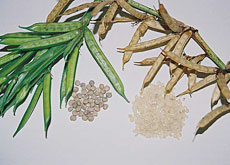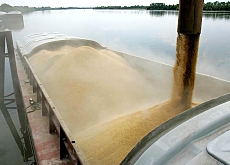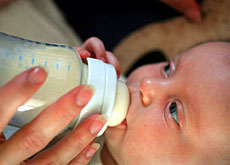Dioxin found in Swiss food thickener

Swiss food manufacturer Unipektin has ordered the worldwide recall of a thickening agent found to contain the cancer-causing chemical dioxin.
The recalls follow quality controls by a Czech laboratory and a German company that revealed high levels of dioxin well above European Union standards in an additive made from guar gum produced and exported by the Swiss firm.
According to the Tages-Anzeiger newspaper of Zurich, between 12 and 156 picograms of dioxin per gram of fat were discovered in additive samples tested by a German laboratory on July 13. The EU norm is one to six picograms per gram.
Health experts from canton Thurgau ordered the confiscation and withdrawal of the contaminated additive “Vidocrem”, which is used to thicken yogurt, vinaigrette, mayonnaise and ketchup, as “a danger to consumers’ health” cannot be ruled out. The European Commission also issued a health warning to member states on July 25.
But Christoph Spinner, a cantonal health expert, said the risk remains nonetheless low in products manufactured using this thickener.
“Consumers’ health has not been seriously endangered,” he added.
Investigation
Unipektin said in a statement that the exact cause of the contamination was being investigated.
But the company declared on its website that “according to our current state of knowledge, the contamination occurred with an Indian supplier”.
Unipektin claims it unknowingly exported the contaminated Vidocrem, a thickener made from guar gum, which it had earlier processed from guar flour originally produced by India Glycols Limited.
“The company has provided us with guar flour for about two years and so far we haven’t had any problems,” said Unipektin’s chief executive Bruno Jud.
As a plant and low-fat product, guar flour was not considered a great risk and therefore not tested for dioxin.
Toxic chemical
But it is thought that pentachlorophenol, a toxic chemical compound used in fungicides and insecticides, somehow managed to enter the food chain.
“We are not sure how much [of the product] must be recalled exactly,” Jud told the Tages-Anzeiger, but is likely to be “several tons”.
The additive was delivered to customers in Switzerland, Germany, France, Austria, Britain, Finland, Spain, Hungary, the Czech Republic, Poland, Australia, Japan and Turkey.
Switzerland’s biggest retail chain Migros said on Monday it was recalling three cream powders of its Midor brand.
“The loss of image and financial damage caused by this case could be substantial for the company,” commented Jud.
swissinfo with agencies
Unipektin is worldwide leader in plant engineering, construction and automation for the fruit juice industry.
The company also produces natural food additives, such as thickeners, and has been running its own industrial fruit-processing facility in Eschenz, canton Thurgau, since 1941.
Unipektin has a total of 85 staff.
A picogram is one millionth of a millionth of a gram.
Dioxins are a group of chemicals known to increase the likelihood of cancer. An unwanted byproduct, they are formed when heating processes create certain chemicals.
Dioxins exist everywhere – they are present in the atmosphere, soil, rivers and the food chain.
They mainly come from waste incinerators and chemical and fertiliser manufacturing plants. They have been more widespread since the introduction of a new chlorine production technique in 1900. However, volcanoes and forest fires also produce dioxins.
Most concerns now lie with the potential of dioxins to cause cancer, but they are also suspected of affecting reproductive health, lowering sperm counts, causing behavioural problems and increasing the incidence of diabetes.
In living organisms, toxins reside in fat. This means they can persist in the food chain through a process called bioaccumulation.
They are mainly found in meat and dairy produce, but are also found in poultry, fish and on unwashed fruit and vegetables.

In compliance with the JTI standards
More: SWI swissinfo.ch certified by the Journalism Trust Initiative











You can find an overview of ongoing debates with our journalists here . Please join us!
If you want to start a conversation about a topic raised in this article or want to report factual errors, email us at english@swissinfo.ch.